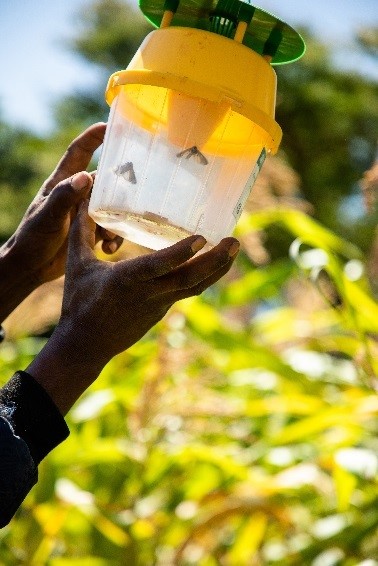
Integrated Intervention Approach Combats Fall Armyworm
By Jessica Joye | November 14, 2018
Maize is one of Ethiopia’s main staple foods, as well as one of its largest commodities in terms of production, area covered, and size of farm holdings. However, the arrival of Fall Armyworm (FAW) to Ethiopia in 2017 threatened the crop and the millions of farmers whose livelihoods depend on it. Despite control efforts initiated across the maize value chain, 2017 losses were estimated at 134,000 tons, representing more than $29 million in lost revenue.
To address this critical threat, the Fintrac-implemented Feed the Future Ethiopia Value Chain Activity (FTFE-VCA), launched a massive radio awareness campaign, reaching almost 3 million farmers across its four target regions. Educational messages focus on the behaviour, bio-ecology, and impact of FAW on maize and other crops, and promote scouting, monitoring and control measures to prevent and eradicate the pest.

Fintrac’s VCA team helped install 216 pheromone traps across target regions, training farmers in proper monitoring and providing smartphones to capture and report real-time data.
A 24-minute weekly radio show launched with support from Farm Radio International airs in six languages, with a call-in feature that allows farmers to get instant advice from agronomic experts including Fintrac technicians.
Early detection and proper control methods, as highlighted in the radio shows, help farmers mitigate potentially disastrous crop losses, and recent field studies show damage caused by FAW is significantly lower than last year despite similar levels of infestation.
Officials at the Ethiopian Ministry of Agriculture and Livestock Resources (MoALR) are optimistic. “We are achieving our collective milestones,” says Zebdios Selato, Plant Protection Directorates Director. “FTFE-VCA is playing a major role; we appreciate [their] constant support to development agents and farmers.”
To generate real-time data for the radio shows, and provide demonstration-based training, FTFE-VCA invested in 216 pheromone traps and 96 smartphones. The Fintrac team trains lead farmers to install and monitor the traps, track and record infestation rates, and use phone applications to report relevant FAW data. Forecasters feed information into a national database and inform farmers in their communities during field days and social gatherings; and FTFE-VCA lead farmers also serve as resources for radio producers by sharing information they gather from the traps.

Lijalem Debas, 24, visits his demonstration plot daily to check his pheromone trap and upload data via his smartphone. Lijalem is emerging as a community expert in FAW.
FTFE-VCA targets youth in particular to become lead forecasters, encouraging them to use new technologies and emerge as community leaders. Lijalem Debas, 24, is one such role model, applying good agricultural practices learned from Fintrac technicians on his farm, and then advising fellow farmers to do the same.
“I was not aware of utilizing anti-pest spray equipment, fertilizer, or other basic agricultural inputs,” he said. “But I have learned a lot from the trainings. I’m using the mobile apps to gather data on FAW. I go to church and marketplaces every other day to educate the community on FAW and early warning systems.”
Once the problem has been identified and controlled, the next step is to prevent future infestations. To address a lack of trained spraying providers, FTFE-VCA partnered with CropLife International to create a network of professional sprayers. To date 240 spray service providers (SSPs) have been trained that will serve communities (and reach 20,000 farmers) at an affordable price.
Wesena Diro, one of the trainees in Oromia, said farmers in his village now prefer to use a professional service. “Understanding among farmers on the danger of spraying without proper protection and training is growing. I believe campaigns like the radio show by FTFE-VCA are helping to create a more cautious farmer who will seek our service regularly.”
So far, Wesena has sprayed 13 hectares of land and the result has been encouraging.
“Farmers love radio and consider it a credible source of information. It’s important to keep the show going and stress the message that it’s safe and cost effective to hire a professional spray service.”